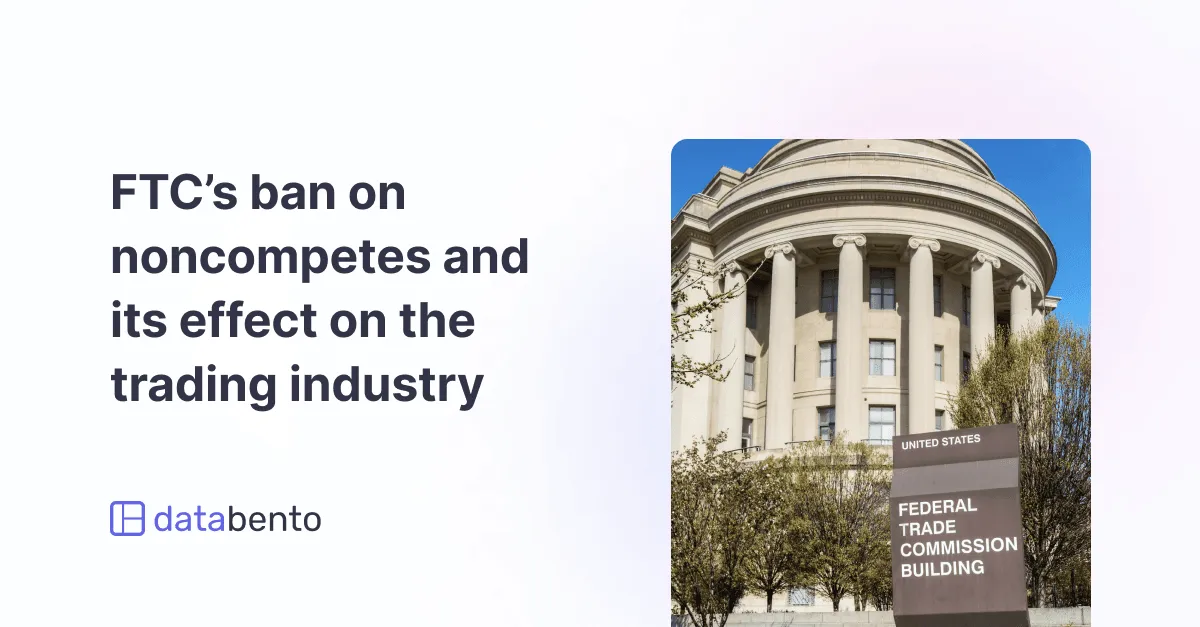FTC’s ban on noncompetes and its effect on the trading industry

The Federal Trade Commission (FTC)'s final rule to ban noncompetes, announced today, will likely upend the trading industry. It renders existing noncompetes unenforceable, except for senior executives, and requires employers to notify current and former employees that their noncompete clauses are no longer in effect.
For the most part, the FTC's rule seems to adopt an approach similar to that of the state of California. Before exploring its implications for finance at large, it's important to consider how firms based in California bypass state laws prohibiting noncompetes.
Without namedropping, a few prominent trading firms are already based in California, and it often puzzles people how they sidestep this issue.
The key is the existence of sections 16601 and 16602.5 in California’s Business and Professions Code, which allow for noncompetes against LLC members and business owners. As is, it’s entirely legitimate for a trading firm based in California to have hundreds of “member-employees” receiving K-1s and to include noncompetes in their LLC operating agreement.
Most employees are accustomed to receiving W-2 income; however, K-1s are already popular in the trading and private funds industry because of the perks of pass-through taxation.
If the rule stands appeal, trading firms will likely attempt to hold many existing noncompetes valid on the basis that their key employees are “senior executives.” This is similar to the California strategy and takes advantage of the following carve-out:
Under the final rule, existing noncompetes for senior executives can remain in force. Employers, however, are prohibited from entering into or enforcing new noncompetes with senior executives. The final rule defines senior executives as workers earning more than $151,164 annually and who are in policy-making positions.
FTC further clarifies that its definition of a “worker” here encompasses the LLC member-employee in the California example:
The Commission declines to specify that a “worker” includes an owner who provides services to or for the benefit of their business because the definition already encompasses the same.
Section 910.1 defines “policy-making position” as a business entity’s president, chief executive officer or the equivalent, any other officer of a business entity who has policy-making authority, or any other natural person who has policy-making authority for the business entity similar to an officer with policy-making authority.
Section 910.1 also defines terms used in the definition of “policy-making position.” Section 910.1 defines “officer” as a president, vice president, secretary, treasurer or principal financial officer, comptroller or principal accounting officer, and any natural person routinely performing corresponding functions with respect to any business entity, whether incorporated or unincorporated.
The FTC’s final rule prevents these firms from entering into noncompetes, but employers still have legal tools at their disposal. This move may shift the attention to nondisclosures and the assignment of proprietary inventions instead. However, the enforcement of these agreements may present a challenge.
There are many other ways this can go:
- An interesting thought experiment is that senior executives would suddenly be much more valuable because of the notional value of their existing noncompetes. Could an existing employee in a policy-making position negotiate a “noncompete refresher” for higher pay within 120 days after the rule is published in the Federal Register?
- Despite the rule's intention to raise wages, would new employees be paid less to discount the subsidized training you may be giving to a future competitor?
- Will there be a flurry of hiring activity as firms reposition themselves to poach more aggressively from their competitors?
The deepest moat that a trading firm can build over its competitors is its production cycle. This includes the details of every workflow: integration of data sources, data preprocessing and ETL pipelines, model training pipelines, code deployment, market access and fees, logging, post-trade operations, and more. This has always been the case.
A firm with a good production cycle will find it much easier to retain their best talent amidst this ruling.
Companies might increasingly resort to litigation to guard their interests, potentially using lawsuits to stall former employees—regardless of the merits of their claims.
The announcement of this rule coincides closely with the media coverage of a high-profile legal battle between two large firms. The case is centered on allegations of the theft of trade secrets (lucrative in-house trading strategies) and violation of confidentiality agreements, not noncompetes. The line between legitimate protection and anti-competitive behavior can be thin.
As anyone who has worked in the quantitative trading industry can attest, non-US firms are overrepresented in the industry. Notably, the ruling explicitly excludes overseas employers.
In addition, the Commission declines to add language in the final rule stating that it does not apply to overseas employers or to non-competes not subject to U.S. State law. The final rule may apply to overseas employers if the non-compete purports to restrict work or starting a business in the U.S. and the reviewing court applies U.S. law.
The FTC’s rulemaking appears to make for likely challenges in court:
Furthermore, the final rule includes a severability clause clarifying the Commission’s intent that if a reviewing court were to hold any part of any provision or application of the final rule invalid or unenforceable — including, for example, an aspect of the terms or conditions defined as non-competes, one or more of the particular restrictions on noncompetes, or the standards for or application to one or more category of workers — the remainder of the final rule shall remain in effect.
- Redmond, J., Faibairn, J.S., and Ignacio, E. “Covenants Not to Compete in Limited Liability Company Operating Agreements May Be Enforceable Without Payment for Goodwill”. Available online.
- Darwin, R. C. “The Enforceability of Covenants Not to Compete in Limited Liability Company Operating Agreements”. Available online.